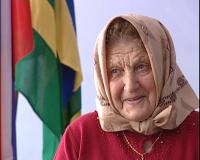Back then everyone had to work and obey

Stáhnout obrázek
Anna Matiová was born on May 4, 1924 in Čaňa into a workman‘s family. She grew up in modest conditions and her parents could hardly find a job during the crisis. Due to want of money Anna couldn‘t pursue her studies. In 1938, when their lives were affected by the Vienna Award and Hungary‘s annexation of southern Slovakia, Anna was just finishing the compulsory education. Then she continued at a two-year school of economics. Anna as a young girl was not interested in public affairs at all, but she still remembers an arrival of Hungarian soldiers in her native village and ban on using the Slovak language during holy masses. Want of money forced Anna to go into service; she started working as a house girl in a Jewish family in Košice. However, the family was deported in 1944 and she saw them never again. Anna returned to his native village, where she experienced the dramatic moments of liberation as well as the end of the war. Čaňa and the rest of the territory was ceded back to Czechoslovakia after the war, therefore a lot residents of Hungarian nationality left the village. Anna got married and started a family, but she had to solve problems of a lack of job opportunities repeatedly. After many years of working for the collective farm, she found a job as a cook; however, she decided to return to the collective farm later. As a mother of seven children she retired at the age of 53.
